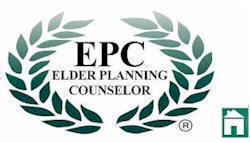
ELDER PLANNING COUNSELOR (EPC) DESIGNATION
PLEASE NOTE – Although this material makes reference to the financial advising profession, the EPC Designation program is structured for any individual or profession who is working with our aging society.
The Elder Planning Counselor plays an especially important part in dealing with elders on a financial, social and health basis.
Any professional who collaborates with elders will be exposed to the power of having the EPC Designation. Financial Services Professionals, Real Estate Agents, Doctors, Nurses, Healthcare workers, Caregivers, Nursing & Retirement Homeowners or employees, Social workers as well as Funeral Home Directors are only some professions and occupations that will benefit from this highly sought-after Designation.
Although there are many of the previous professional disciplines who have achieved their EPC Designation, the majority are from the financial services industry. Each chapter description shows how the financial advisor will benefit from the EPC Designation.
The astute professional who recognizes elder trends, wants, and needs, will have an ample supply of clients, prospects, and referrals to keep them busy.
When we make reference to any statistics or facts in the materials, we use the most recent information available at the time that the current edition goes to print. For example, any facts that are referenced from Statistics Canada, are the most recent available due to their most recent surveys and research.
The 2024 - 12th Edition EPC Designation program is based on the following 4 Module Desk Reference Set material covering the following curriculum:
Module 1 – Aging & Health Issues
1. Situation Critical – Our Population is Aging
2. The Social Aspects of Aging
3. Successful Aging – Improving Health Span
4. Managing Chronic Conditions & Mental Health Issues
5. Dementia & Our Aging Society
6. Nutrition, Malnutrition & Elders on the Move
Module 2 – Social & Psychological Issues
1. Long Term Care Issues
2. Elder Housing Options
3. Caregiving in Canada
4. End-Of-Life Planning Issues
5. Funeral Planning
6. Bereavement – Grief, Mourning & the Healing Process
Module 3 – Financial Issues
1. Social Security & Health Care
2. Retirement Planning & Investing
3. Generating Retirement Income
4. Legacy Planning
5 Travelling or Moving Abroad
6. Income Tax Planning
Module 4 – Communication and Other Timely Issues
1. Communicating with Elders
2. Marketing to Elders
3. Elder Fraud and Financial Exploitation
4. Elders and Ethics
5. Putting It All into Perspective

View the Complete in-depth description of the EPC
curriculum here:

Canadian
Initiative for Elder Planning Studies Inc.
203-4438 Ontario Street
Beamsville, ON L3J 0A4
Toll Free Phone
855-882-3427 Toll Free Fax 866
209-5111
This web site Copyright CIEPS (2020) Ltd